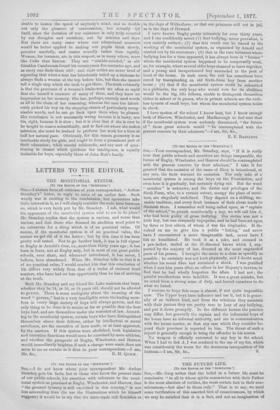LETTERS TO THE EDITOR.
THE MONITORIAL SYSTEM. (To TES EDITOR Or THE "spiv:awns.") SIR,—I abstain from all criticism of your correspondent, "Arthur Sttachey's" letter, in reply to mine of an earlier date. Such wordy war is exciting to the combatants, but spectators take little interest in it, so I will simply consider the main issue between us, which is very fairly put by Mr. Strachey. I ask, what would
the opponents of the monitorial system wish to see in its place?
Mr. Strachey replies that the system is useless, and worse than useless, and that those who demand its abolition need point to no substitute for a thing which is of no practical value. Of course, if the monitorial system is of no practical value, the sooner we get rid of it the better ; but by this time it has been
pretty well tested. Not to go further back, it was in full vigour at Rugby in Arnold's time, i.e., more than thirty years age ; it has
been in force, not at Rugby only, but in most of our great public schools, ever since, and whenever introduced, it has never, I believe, been abandoned. When Mr. Strachey tells us that it is of no practical value, I would remind him that this conclusion of his differs very widely from that of a series of eminent head masters, who have had no less opportunity than he has of arriving at the truth.
Both Mr. Strachey and my friend Mr. Lake maintain that boys, whether they be 14, or 16, or 18 years old, should not be allowed to govern. There is some ambiguity about the meaning of the word " govern," but in a very intelligible sense the leading mem- bers in every large society of boys will always govern, and the only thing to be done is to secure as far as possible that the best boys lead, and are themselves under the restraint of law. Accord- ing to the monitorial system, certain boys who have distinguished themselves above their fellows, either by intellectual or moral excellence, are the executive of laws made, or at least approved, by the masters. If this system were abolished, both legislative and executive functions would soon be exercised by mere athletes, and whether the prospects of Rugby, Winchester, and Harrow would immediately brighten if such a change were made does not seem to me so certain as it does to your correspondent.—I am,






























 Previous page
Previous page